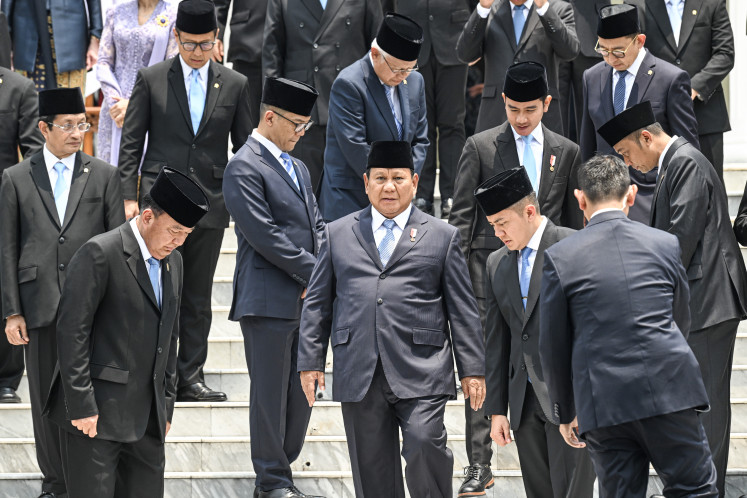Popular Reads
Top Results
Can't find what you're looking for?
View all search resultsPopular Reads
Top Results
Can't find what you're looking for?
View all search resultsForum: Editorial: Regulating forex flows
I support this measure, those who really need to make large payments should be able to produce the necessary documents while speculators will not
Change text size
Gift Premium Articles
to Anyone
I support this measure, those who really need to make large payments should be able to produce the necessary documents while speculators will not.
However, this does not help maintain the value of the rupiah as the demand for the U.S. dollar is so huge.
My thought is that the U.S. government has diversified holdings in many countries stock exchanges, so that when they need the funds, indexes across the world can meet their needs (including their own index) - that may help the real sector - and yes, the real is more important than the artificial.
My question for BI Governor Boediono is this: I don't have the underlying transaction papers that I need foreign exchange, but I want to maintain the value of my assets, how can you help me? True you may increase the interest rate, but still we do not have confidence in the Rupiah as it can only be used in Indonesia, unlike the US dollar, which is acceptable in many countries. HARRY
Jakarta
I do not agree with the decision. If a country allows someone to invest in it surely they are entitled to move their assets to more favorable locations.
This is similar to a person putting money into a bank and then wanting to move it to another bank that gives a better return and then the original bank telling them they cannot have their own money.
If it is understood from the outset that an investment is on a fixed term deposit then there isn't a problem, but if that bank just simply changed the rules people would quite quickly stop investing in it.
This also applies to free trade; countries will not want to do business with a country that restricts imports, no matter how much camouflage is used, as in the present case of food and drink imports. ASTON
Jakarta
Editorial: Global solution to crisis -- Nov. 18, p. 6
Why is it that when Indonesia's press writes these stories they can't tell the truth to their own people? It is going to be a torrid ride for countries like Australia, I can't imagine what it's going to be like there.
To say in this article that Indonesia will have growth of any percentage rate this year is a complete falsehood. Why would a banking system that has almost no regulations at all fair better than the banks here?
Indonesia will be in recession with the rest of us soon -- don't worry the slow down will hit everyone. ROD
Sydney
Dear Rod, the Indonesians are poor right? Well the Aussies are rich by GDP per capita. When the global crisis hit maybe the Aussies will feel the impact, but the Indonesians?
Well, they're already poor anyway! So why do we need to be told of a crisis? Indonesia can't be pessimistic, we can't afford it! Australia might be hit or maybe not since the fundamentals of its economy are strong, but even if Australia is hit, that does not mean Indonesian should eat mud because we are poorer than you guys. Why can't Indonesians be optimist, because, just FYI, Indonesia is the second most confident nation after India in Asia during this time of crisis, and why not? EDIT
Jakarta
'Reduce waste' -- Nov. 17, p. 4
Solid waste management in Jakarta is very critical now. I agreed that 3R (reduce, reuse and recycle) is a good concept of waste minimization, but it will take a lot of time to penetrate into the people's mind as well as lead to change their behavior.
The government must make practical decisions based on the reality of solid waste management in Jakarta. It will take time for community composting to lead to actual reduction of waste. Intermediate treatment of waste for reducing its amount is essential to address the current solid waste management issue immediately. TOSH
Jakarta
Most of Jakarta's garbage consists of organic, biodegradable waste. With coordinated efforts to develop neighborhood composting, this would already greatly reduce the volume of waste that has to be transported at great cost (fuel, pollution, traffic) to the landfill. MARC
Jakarta










